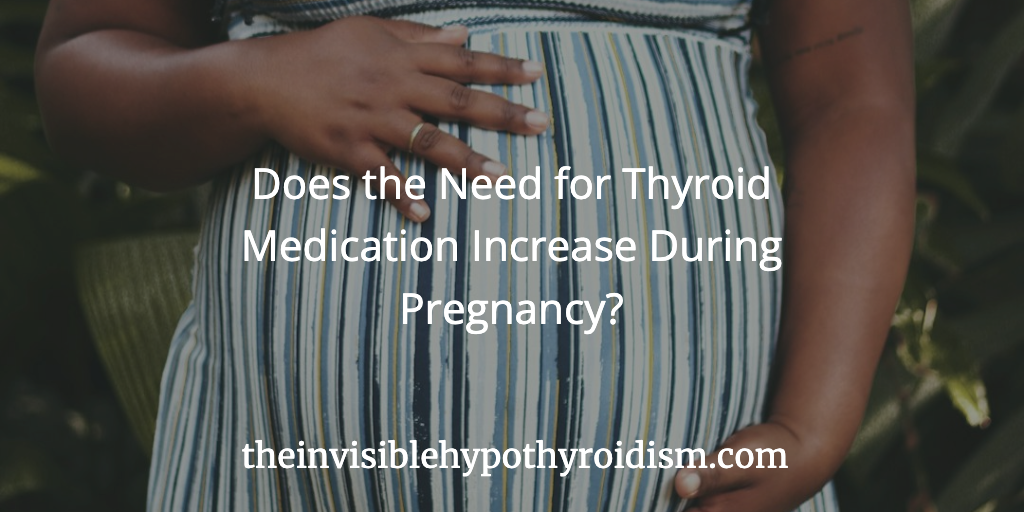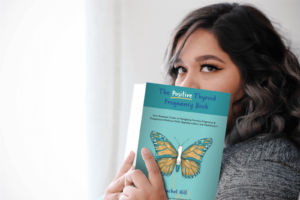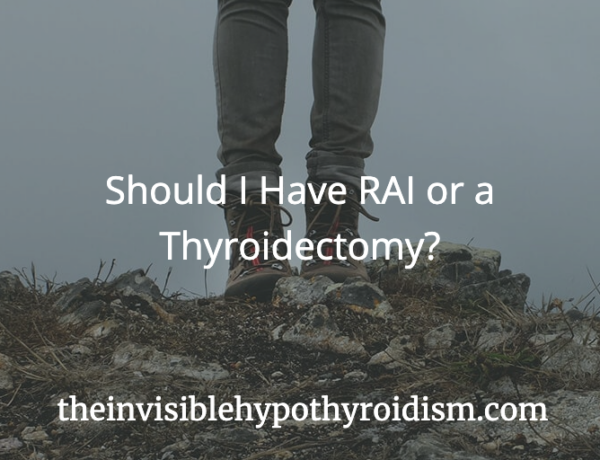Originally published on 16th November 2021 Last updated on 7th August 2024
The questions I often see asked surrounding hypothyroidism and pregnancy include:
- Can I have a healthy pregnancy with a thyroid condition?
- Do I still need to take my thyroid meds during pregnancy?
- Will my dosage of thyroid meds change in pregnancy?
The answers?
- Yes, you can have a healthy pregnancy.
- Yes, you need your thyroid hormone replacement more than ever when pregnant.
- Yes, usually your medication dosage increases.
Let’s discuss that last one surrounding medication changes.
As Soon As You Know You’re Pregnant, See Your Doctor
As soon as you know you are pregnant, inform your doctor and get a full thyroid panel test booked in as soon as possible. That’s a full thyroid panel. Not just TSH and Free T4, but Free T3 and thyroid antibodies too. Have your thyroid levels evaluated and checked to see if you already need an increase in thyroid hormone replacement medication.
For T4-only medications such as Synthroid and Levothyroxine, it is common for doctors to increase the dosage as soon as a pregnancy is confirmed. For T3 containing medications, your doctor may also do this, but it seems less common.
During my first pregnancy with hypothyroidism and Hashimoto’s and on Armour Thyroid (NDT), I didn’t require a dosage increase until the third trimester, so every woman’s needs can differ. This is likely due to the type of thyroid medication I was on.
After all, a small study from 1990 revealed that although pregnant women taking Levothyroxine (Synthroid) needed an increase in dosage to maintain good thyroid hormone levels in pregnancy, women on NDT medications (such as Armour) did not need to. So this is definitely something to monitor closely and observe in regards to your personal needs. [1]
During my second pregnancy, I was on Armour Thyroid and a small amount of Levothyroxine, a combination I had been on for a year prior to falling pregnant. Again, my Armour dosage remained the same until late in pregnancy, but my Levothyroxine dosage needed to be increased quite early on and it was increased a few times throughout my pregnancy.
Read about the different types of thyroid meds here.
Levels are usually checked every 4-6 weeks throughout pregnancy to keep an eye on any dosage adjustments.
Related Articles:
- 10 “Truths” About My Pregnancies with Hypothyroidism and Hashimoto’s
- Were My Thyroid Pregnancies What I Expected?
- Can I Prevent My Child From Developing Hashimoto’s or Hypothyroidism?
Don’t forget that The Positive Thyroid Pregnancy Book: Your Essential Guide to Navigating Fertility, Pregnancy & Postpartum Wellness With Hypothyroidism and Hashimoto’s also covers my two pregnancies with hypothyroidism and Hashimoto’s in a lot of detail, while also compiling ALL the info you need to know for the best start for you and your baby.
Why The Demand For Thyroid Hormone is Higher
In the first trimester of pregnancy, the foetus relies entirely on the mother to provide thyroid hormone for its development; the development of its brain health in particular. For someone with a perfectly healthy thyroid gland and function, their body is able to meet this extra demand easily, however, for someone with hypothyroidism, their body is often not able to.
Once the baby develops its own thyroid gland and this begins to function by around 18 weeks, the demand is not as great.
According to the Endocrine Society’s 2007 Clinical Guidelines for the Management of Thyroid Dysfunction during Pregnancy and Postpartum, thyroid medication usually needs to be increased in dosage, by 4-6 weeks gestation and may well require a 30-50% increase in dosage. Most women with existing hypothyroidism require an increase in thyroid medication when pregnant, to support the developing baby. [2]
Failure to properly maintain good thyroid hormones levels whilst pregnant can result in complications such as miscarriage, pre-eclampsia, anaemia, stillbirth and the baby developing congenital hypothyroidism itself. [3]
Doctors are also often concerned about the baby’s brain development.
Thyroid Levels During Pregnancy
The American Thyroid Association (ATA) recommends the use of the following TSH test ranges during pregnancy: [4]
- First trimester: 0.1-2.5 mu/L
- Second trimester: 0.2-3.0 mu/L
- Third trimester: 0.3-3.0 mu/L
But maintaining optimal thyroid levels for all of the thyroid panel is important, not just TSH. This includes Free T3, Free T4 and thyroid antibodies too.
The NHS in the UK recommends using the following: (though the exact numbers can differ slightly depending on the surgery and lab)
TSH:
(Non-pregnancy range for TSH is usually around 0.5 – 4.4 mu/L)
- 1st Trimester: 0.09 – 2.83 mu/L
- 2nd Trimester: 0.2 – 2.8 mu/L
- 3rd Trimester: 0.31 – 2.9 mu/L
Free T4:
(Non-pregnancy range for Free T4 is usually around 10 -20 pmol/L)
- 1st Trimester: 10.5 – 18.3 pmol/L
- 2nd Trimester: 9.5 – 15. 7 pmol/L
- 3rd Trimester: 8.6 – 13.6 pmol/L
Free T3:
(Non-pregnancy range for Free T3 is usually around 3.5 -6.5 pmol/L)
- 1st Trimester: 3.5 – 6.2 pmol/L
- 2nd Trimester: 3.4 – 5.8 pmol/L
- 3rd Trimester: 3.3 – 5.6 pmol/L
Your doctor should be keen to keep your thyroid hormone levels within these adjusted pregnancy ranges, in order to look after both your own and your baby’s health.
It is normal and in fact the case for most women, that an increase in their thyroid hormone replacement medication will be needed. To support their pregnancy and the baby. Your body needs crucial thyroid hormone more than ever at this time.
What has been your experience of pregnancy and hypothyroidism?

See Also:
The Positive Thyroid Pregnancy Book: Your Essential Guide to Navigating Fertility, Pregnancy & Postpartum Wellness With Hypothyroidism and Hashimoto’s which covers Rachel’s full two pregnancies with hypothyroidism and Hashimoto’s, on Levothyroxine and Armour Thyroid NDT and everything YOU need to know for the best start for you and your baby.
References:
[1] https://pubmed.ncbi.nlm.nih.gov/2371025/
[2] https://www.ncbi.nlm.nih.gov/pmc/articles/PMC2533153/
[3] https://www.niddk.nih.gov/health-information/health-topics/endocrine/pregnancy-and-thyroid-disease/Pages/fact-sheet.aspx#pregnancy
[4] https://www.verywell.com/thyroid-disease-in-pregnancy-introduction-3232965






